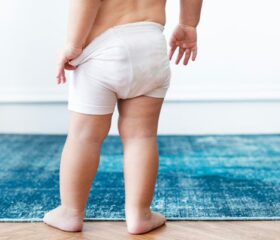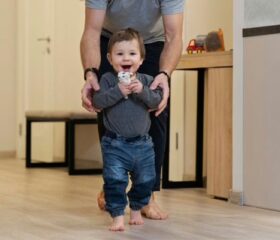17 Signs Your Toddler Is Ready for Potty Training
If your child is over one and a half years old, the days of potty training aren’t far away! She’ll show signs of readiness before long.

Potty training is an exciting (albeit potentially messy) step. Like most parents, you probably want to get it over with as soon as possible.
A key to potty training your child quickly is to know when to start. If she’s physically, mentally, and emotionally ready, you’ll have a much easier time of it. Let’s take a look at the 17 signs your child is ready for potty training and what to do if she isn’t ready when you were expecting her to be.
When are most toddlers ready to potty train?
By and large, children develop bladder and bowel control when they’re between 18 and 24 months old. 1 However, that doesn’t necessarily mean they’re ready to potty train. There are other signs you need to look out for (more on that later).
According to the American Academy of Pediatrics, most children in the US begin potty training around 2 to 3 years old and are fully trained by 4 years old. 1 This is just an average; a perfectly healthy child can reach this milestone a little earlier or later.
Don’t force your child to potty train right after her second birthday just because that’s when many parents start. She may take longer to get the hang of it if she’s not truly ready. 2 Instead of fixating on her age, learn the signs that suggest your little one is ready for the challenge.
What about children with special needs?
The signs of potty training readiness are the same for children with special needs. With that said, they often have unique challenges when learning to pee and poop by themselves. For example, if your child has cerebral palsy, she might not have as much bladder control as other kids. 3
If you’re potty training a child with special needs, you’re best off getting tailored advice and guidance from your pediatrician.
What signs suggest your toddler is ready to potty train?
Your toddler will show signs of readiness in three main developmental aspects: physical, behavioral, cognitive and communicative. If she checks off multiple signs below, it might be time to give potty training a shot.
4 signs of physical readiness
First and foremost, your toddler must have the physical skills to take on this task. Check if she can:
- Stay dry after naps or for two or more hours during the day 1
- Pull her pants up and down by herself 2
- Walk, run, and sit steadily
- Keep to a more regular poop schedule, whether it’s in the morning, after meals, or before bed
If your child has a relatively regular schedule, it may be easier for you to anticipate her potty times, making potty training more practical.
8 signs of behavioral readiness
You can also tell from your toddler’s behavior if she’s ready to potty train. She should be:
- Independent and starting to demand to do things herself
- Interested in wearing big-kid underwear 2
- Curious about the process of going to the toilet (e.g., she follows you to the toilet or pretends to use the toilet) 2
- Uncomfortable wearing wet or dirty diapers and wants you to change her right away 2
- Able to get on and off the toilet by herself 4
- Able to sit and play for five or more minutes 5
- Generally cooperative when you ask her to do something
5 signs of cognitive and communicative readiness
As your toddler grows older, she’ll come to understand things and communicate better, both of which are essential for potty training. Your toddler may be mentally mature enough to potty train if she can:
- Follow simple instructions like “hand me the toy” 2
- Recognize she’s peeing or pooping (e.g., she’ll hide in a corner when she goes or announce she just went afterward) 4
- Tell you with simple words or show you with gestures or sounds that she needs to pee or poop 5 2
- Hint that she has a wet or dirty diaper 2
- Mimic the actions of adults, like standing beside you and pretending to wash dishes, cook, or type on the computer
What signs suggest your toddler isn’t ready to potty train?
To reiterate, don’t make your toddler potty train if she isn’t ready. You may only end up delaying the process, and forcing it could even lead to issues like constipation. 6
That’s why it’s also important to look out for the signs that she isn’t ready for potty training, like if she:
- Can’t stay dry: For starters, if your toddler can’t stay dry for two hours during the day, walk to the toilet, or sit still for a few minutes, she may not be physically ready.
- Isn’t aware she’s peed or pooped: Another telltale sign is if your toddler isn’t aware she has just peed or pooped (e.g., she continues playing without missing a beat after going).
- Is unwilling to potty train: If your toddler seems physically ready but shows no curiosity or is even afraid of going to the toilet, you might want to wait a little longer.
- Can’t express herself: It’s also best to wait until she can verbally express her needs in simple words, such as “pee” or “poo”; otherwise, communication may be too much of a challenge. (If your child isn’t able to verbally communicate but is able to express herself through gestures, that may also be enough.)
Remember that all children hit milestones at different ages. If yours isn’t ready for potty training right now, it’s probably nothing to worry about. With that said, if she doesn’t show signs of readiness by preschool age, bring it up with your pediatrician.
Make sure it’s the right time for you to potty train your child
In addition to checking your child’s readiness, you also have to make sure you’re up for the task. It’s a good idea to hold off on potty training if there’s an upcoming event that may take up a lot of your time and energy or cause stress in your household (e.g., you’re moving, sick, or about to give birth to another baby).
What should you do if potty training isn’t working?
If you’ve been trying for a while and your toddler refuses to potty train or shows no improvement, it’s okay to press pause for a few weeks. 2 Sometimes, a break can help things click into place faster next time.
Remember that potty training is a process. While some programs promise quick results, it’s possible your child will take longer than expected. She might also regress for a while after making some progress. 7
Use your journal or one of those baby tracker apps to record successful potty trips, accidents, and the timing of both, which can help you identify patterns that can give you a better idea of what the issue is. Logging this info is also useful if you need to report anything to your pediatrician.
Throughout potty training, always be patient with your child and follow her pace.
Final thoughts
Many parents dream of the day they’ve fully potty-trained their toddler. But no matter how much you want to teach your child to use the toilet, you’ll need to wait until she’s ready. Starting too early will only lead to frustration for both of you.
Keep an eye out for signs your child is mature enough to start the process. When the day comes, chances are that she’ll get the hang of it within days or a week. If not, don’t be discouraged; give her a break so she can come back stronger. Those stinky diapers will soon be a thing of the past!
Article Sources
- American Academy of Pediatrics. "The Right Age to Potty Train" Retrieved July 29, 2025.
- MedlinePlus. "Toilet training tips" Retrieved July 29, 2025.
- American Academy of Pediatrics. "Potty Training Children with Special Needs" Retrieved July 29, 2025.
- Bureau of Communicty and Health Systems Child Care Licensing Division. "Toilet Learning and The Toddler" Retrieved July 29, 2025.
- Public Health Seattle & King County. "Toilet Training" Retrieved July 29, 2025.
- National Center for Biotechnology Information. "Overview: Potty training" Retrieved July 29, 2025.
- Oklahoma Department of Health. "Potty Training" Retrieved July 29, 2025.






